Delegation of Russian Church attend the memorial ceremony for Russian war prisoners who died in Slovenia in World War I
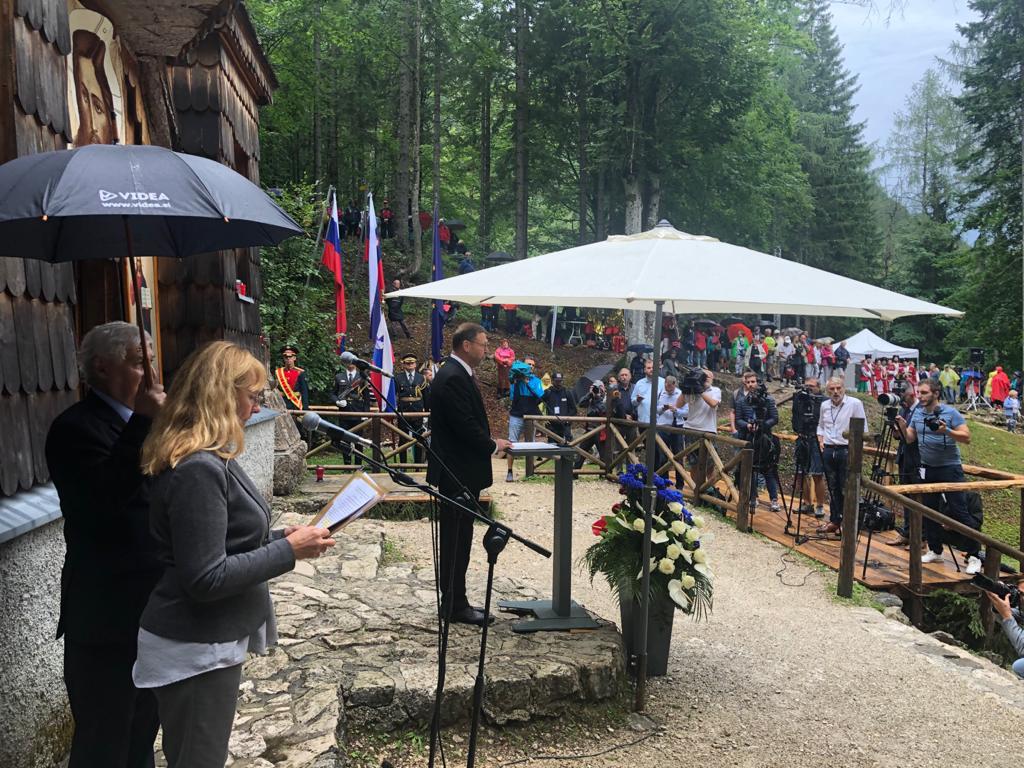
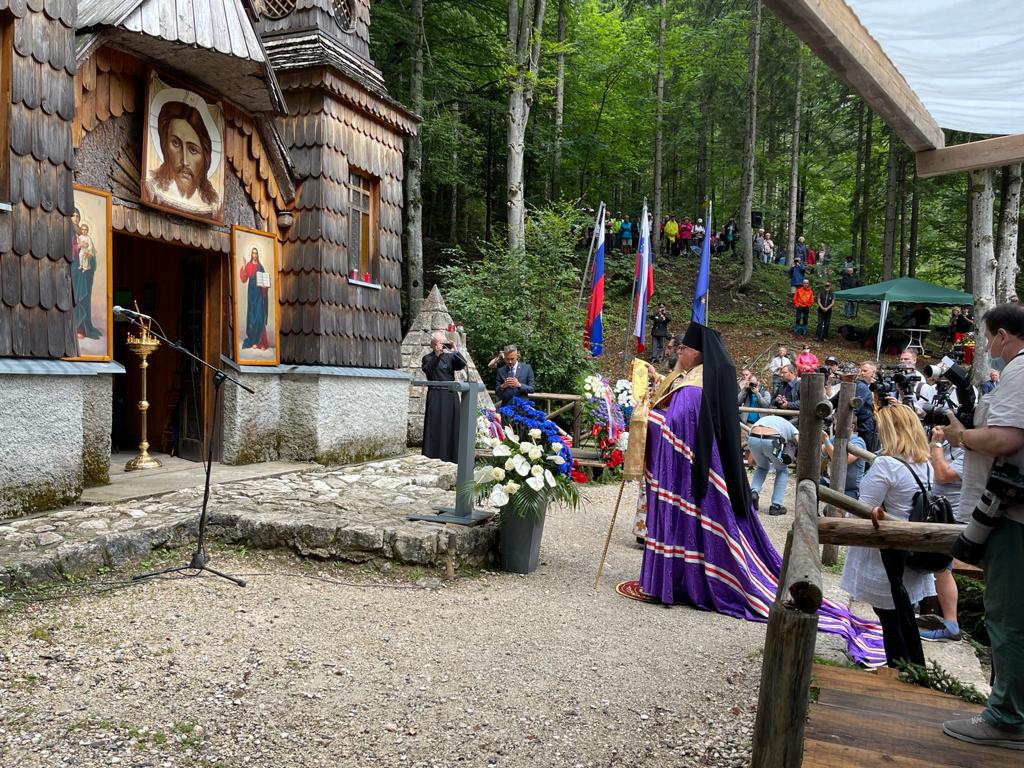
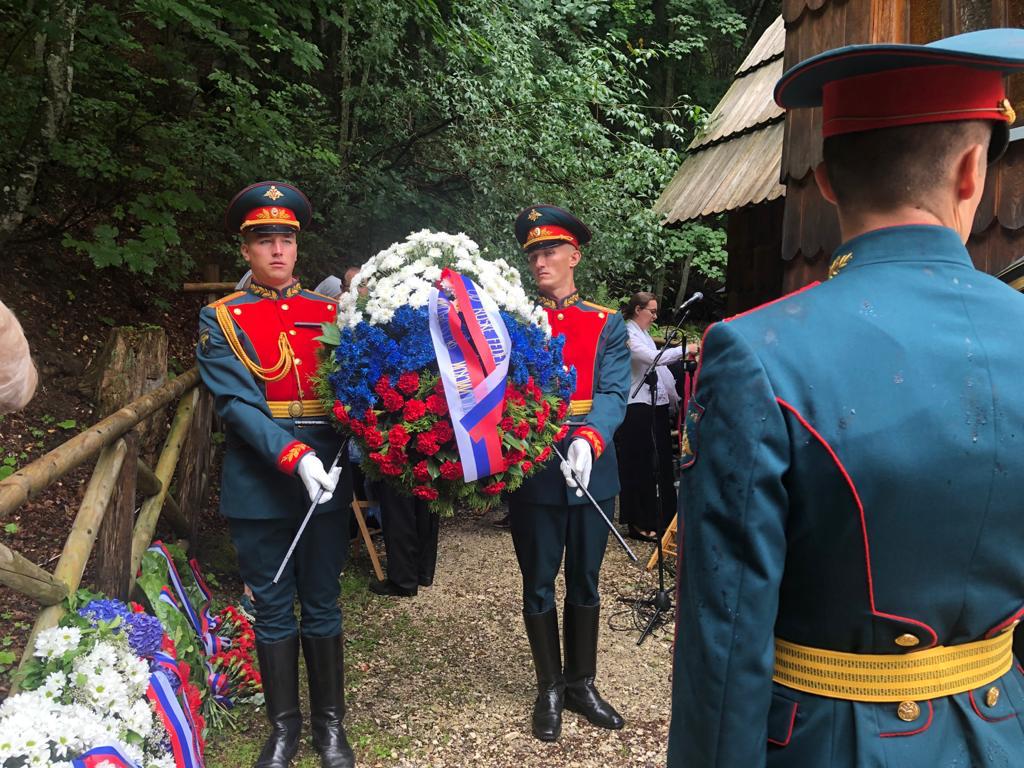
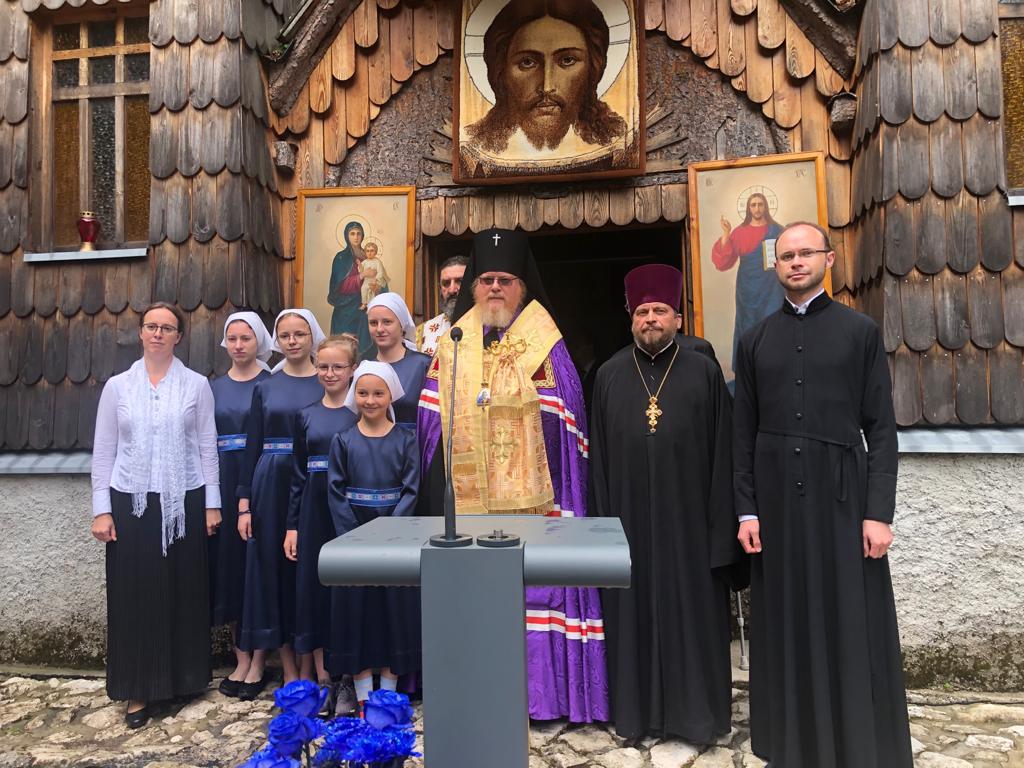
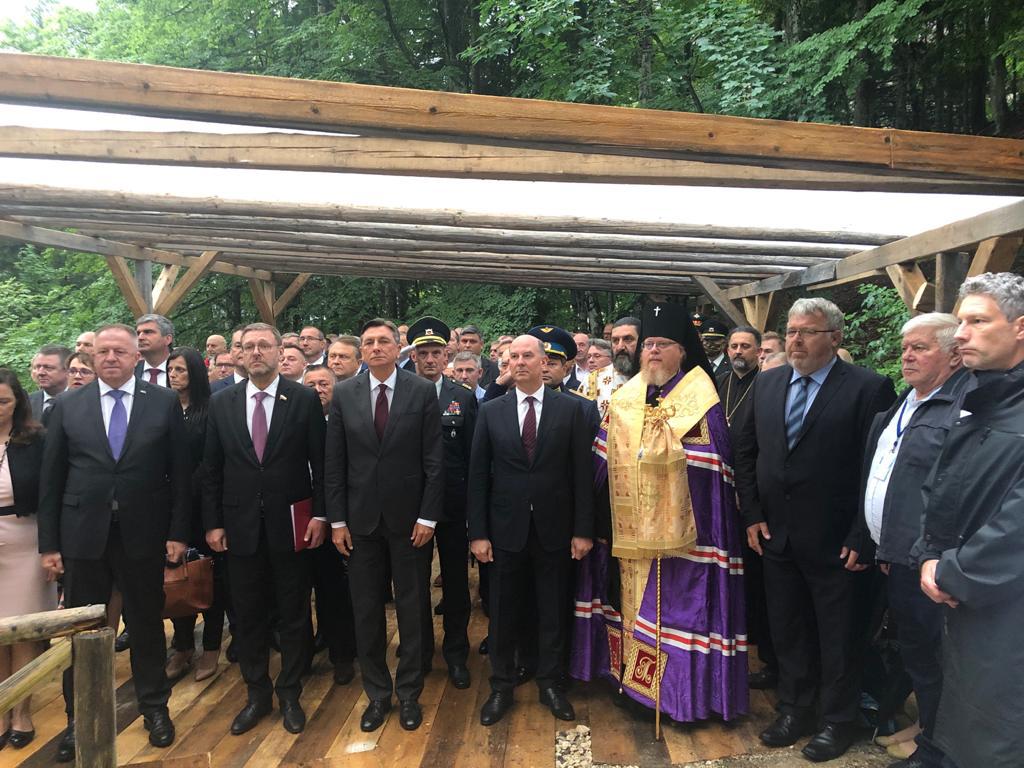
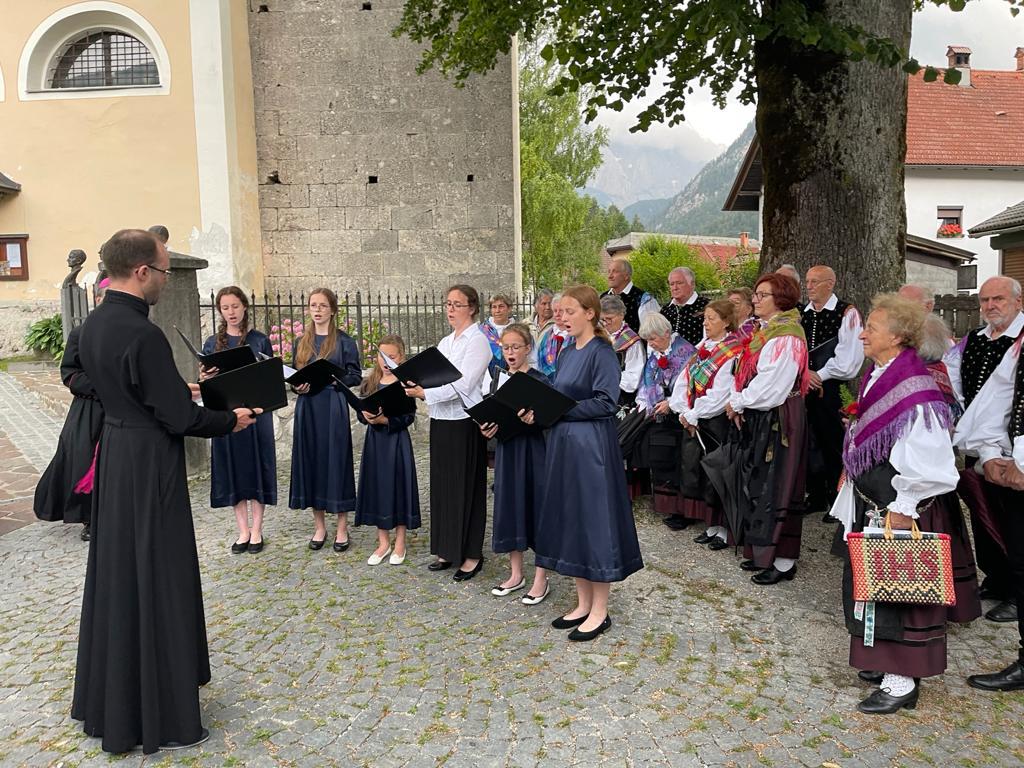
On July 30 and 31, with a blessing of His Holiness Patriarch Kirill of Moscow and All Russia, the administrator of the Diocese of Berlin-Germany, Archbishop Tikhon of Ruza, attended the event devoted to the 105th anniversary of the foundation of the Russian Chapel of the Holy Prince Vladimir Equal-to-the-Apostles on the Vršič Pass. The chapel was built in that place in memory of Russian war prisoners who were killed during World War I.
This year, the celebrations devoted to the 105th anniversary of the Russian Chapel, which was built by Russian war prisoners in memory of their comrades who were building a road through the Alps and were killed by an avalanche, were held for the first time as part of the Day of Russia-Slovenia Friendship. Over 500 people took part in the event organized by Kranjska-Gora city council, the Russkiy Mir foundation and the Slovenia-Russia Friendship Society, which marks its 25th anniversary this year.
On July 31, the solemn memorial ceremony took place at the Russian Chapel under the Vršič Pass. Among the participants were representatives of Slovenian authorities: Slovenia’s President Borut Pahor, Mr. Alojz Kovsca, Chairman of the National Council (upper chamber of Slovenian Parliament); Mr. Zdravko Pocivalsek. Minister of Economic Development and Technologies, and Mr. Janez Hrovat, Major of Kranjska-Gora.
Present were also Archpriest Borislav Livopoljak (Serbian Orthodox Church), Bishop Stanislav Lipovsek (Roman Catholic Church), Bishop Leon Novak (head of the Evangelical Church of Slovenia), Deputy Speaker of the Federation Council of the Federation Assembly of the Russian Federation K. I. Kosachev, Russia’s Ambassador to Slovenia T. P. Eivazov, deputy head of the Moscow City Government’s department for external economic and international relations A. Bondaruk, acting chairman of the Slovenia-Russia Association Urban Ocvirk, and first chairman of the Slovenia-Russia Society Saša Gergina.
The service for the repose of the dead Russian war prisoners was led by Archbishop Tikhon of Ruza. The hymns were sung by the choir of the Parish of the Resurrection of Christ in Munich, conducted by Maxim Matyushenkov.
During the litany, prayers were lifted up for the repose of the souls of the passed away servants of God - Orthodox commanders and warriors who died at that place of starvation, wounds and cold.
Before the service, Archbishop Tikhon addressed all those who came on that day to honour the memory of the Russian compatriots who found repose there and noted in particular:
“Lifting up prayers to the repose of the souls of warriors who were killed in the battlefields in the beginning of the 20th century, we cannot but recall other, both sorrowful and heroic pages of our common history - 80 years ago our countries were turned into a battlefield between good and evil for as long as four years. Millions of people gave their lives defending the Motherland from devastation and enslavement, standing up for their religious, moral and civic ideals in face for inhuman ideology of Nazism.
These events of the past firmly inscribed in the historical memory of Russia and Slovenia compel us to treat with special attention what is happening in the world today, to feel our responsibility for the developments. Our life and our earth is a gift of God and we are called to cherish it and to do all that is possible for a good transformation of the world around us. It is our duty before God and our ancestors, who tragically died so that we could live.
On behalf of His Holiness Patriarch Kirill of Moscow and All Russia, I would like to express sincere gratitude to the state authorities of Slovenia and all the fraternal Slovenian people for your preserving the memory of the Russian soldiers for over a century now, for your concern for maintaining friendship and developing cultural relations between our countries a visible expression of which is this chapel in which the prayer to God never ceases to be lifted up. May the Lord bless our fraternal nations”.
After the memorial events at the Russian Chapel, the Slovenia-Russia Friendship Society held its annual meeting in the center of Kranjska-Gora.
The day before, Archbishop Tikhon met with Archbishop-Metropolitan Stanislav Zore of Ljubljana and Primate of Slovenia (Roman Catholic Church).
In Kranjska-Gora, there was also a concert given by the choir of the Parish of the Resurrection of Christ in Munich.
***
The Russian Chapel of the Holy Great Prince Vladimir Equal-to-the-Apostles under the Vršič Pass (near the riversides town of Kranjska-Gora in Slovenia) is a memorial devoted to the Russian soldiers killed in that place during World War I. The monument is located on one of the slopes of the Julian Alps at the height of over 1000 meters above sea level near the Vršič Pass (1622 m).
During World War I, Kranjska-Gora (the last station of the Austrian railway) was a major trans-shipment point for delivering ammunition, equipment and troops to Austrian-Italian front. On the basis of military needs, the Austrian command decided to build a road through Vršič. Already in July 1915, a camp was organized in Kranjska-Gora for Russian war prisoners by whose hands the road through the pass was built.
On March 12, 1916, a snow avalanche swept a group of war prisoners, who were clearing up the road, together with their Austrian guards. According to some estimates, over 300 people were killed. In total for the time of the camp’s existence (1915-17), some 10 thousand prisoners died of toil and starvation.
In memory of their comrades who died under the avalanche, Russian war prisoners built in 1916 a small wooden chapel near their barracks.
In the 1920s, the road through the pass was rebuilt and the remains of the war prisoners buried along it were reburied in a common grave near the chapel over which a small pyramidal obelisk was built in the 1930s with the inscription ‘To the Sons of Russia’. In those years, Russian emigres began to assemble at the chapel in late July, coming from all over then Yugoslavia to honour the memory of their compatriots.
After Slovenia became independent in 1991, an initiative group of Slovenian public, which was to become the core of the Slovenia-Russia Friendship Society founded in 1996, began holding annual meetings of Russians and Slovenians - statesmen, businessmen, representatives of public organizations and the Church, cultural figures - at the Russian chapel on the last Sunday of July.
In 1995, the Russian chapel was granted the status of a state protected monument of culture. In 2005, the adjacent territory was transformed into a memorial park and transferred to the jurisdiction of the Slovenian Ministry of Culture.
In 2005, in anticipation of the 90th anniversary of the Russian Chapel, the Slovenian authorities resolved that the road leading from Kranjsk-Gora past the Chapel of the Holy Prince Vladimir to the the Vršič Pass be named ‘Russian Road’.
On July 28, 2021, Russian President Vladimir Putin and Slovenian President Borut Pahor, during their telephone conversation, agreed to establish the Day of Russian-Slovenian Friendship to be marked on the last Saturday of July, the day of holding the memorial event at the Russian Chapel of the Vršič Pass.
Diocese of Berlin-Germany
DECR Communication Service
